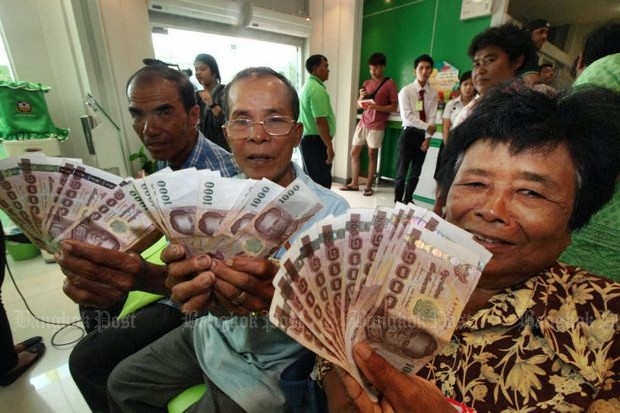
Finance Minister Apisak Tantivorawong has rushed to soothe jitters at the Bank for Agriculture and Agricultural Cooperatives (BAAC) over concerns that the state bank will have to shoulder any losses from the government's storage pledging scheme.
Mr Apisak said he did not expect the Hom Mali rice price of 11,000 baht per tonne to sink further as it is close to the plantation cost of 10,000-11,000 baht.
The cabinet on Tuesday approved a storage pledging scheme for 2 million tonnes of Hom Mali and glutinous rice at 13,000 baht a tonne, aimed at encouraging farmers to store rice in their own barns to delay releasing new supply to the market to shore up weak prices. The BAAC will fund the project.
The 13,000-baht-per-tonne pledging price is set based on 90% of the current market price plus 2,000 baht for harvesting and improvement costs, and another 1,500 baht for storage costs. Farmers who have no barns to store the paddy will not receive the 1,500-baht storage cost payment.
- See main story: Junta targets rice millers
- See also: Petrol stations offer rice-peddling space
To prevent the new rice subsidy from costing taxpayers as in the past, the government has instructed the BAAC to bear any losses, which has raised concerns about the bank's risk exposure.
Mr Apisak said even if rice prices slide further, the BAAC can mill rice and package it to sell for 15 baht per kilogramme, compared with a market price of 20-30 baht a kg now.
A financial accounting of the 15 previous rice subsidy programmes closed on Sept 30, 2014, reporting a loss of 699 billion baht from 2004-13, with 536 billion incurred from four crops during the Yingluck government's scheme, which set the pledging price at 40-50% higher than the market price and left 18.7 million tonnes of rice in state stocks when the scheme was terminated in 2014.
Preventing those who try to cheat the scheme is a priority, he said.
Mr Apisak used a rice farmer in Nakhon Sawan province as an example of graft because his name appeared on the government list for a recent giveaway of 1,000 baht per rai for rice growers, but the farmer did not grow rice at that time.

Apisak: Preventing cheats a priority
Apirom Sukprasert, BAAC's senior executive vice-president, said the bank has accelerated the government's project in providing loans to small and medium-sized enterprises (SMEs) in the agricultural sector to produce value-added products in an effort to solve the low-crop-price problem in a sustainable way.
The bank offers 72 billion baht in loans under the One Tambon One Farming loan scheme for SMEs, under which each qualifying borrower is eligible for a maximum loan of 10 million baht at 4% interest for the first seven years of the repayment period.
In a related development, Commerce Minister Apiradi Tantraporn said Wednesday the ministry pledges to find as many sales channels as possible for rice farmers to dispose of their grains to help deal with falling rice prices and the massive supply from the country's annual harvest season.
Among the efforts, the ministry is partnering with the private sector under the Pracha Rat public-private collaborative scheme to upgrade production and promote marketing for Hom Mali in six northeastern provinces, which are the key production bases of the aromatic rice.
The ministry also plans to hold 102 market fairs for paddy in 42 provinces, stimulating domestic rice consumption by cooperating with the Thai Rice Packers Association. It also asked for cooperation from Thai General Insurance Association to help buy 25,000 tonnes of milled rice to be used as New Year presents to their customers.
Mrs Apiradi said the ministry is also committed to revving up its sales of existing rice stocks both through government-to-government and private-to-private regimens.
It plans to organise rice roadshows in China, Iran, Iraq and Africa from the fourth quarter this year to the second quarter next year.
Vallop Manathanya, vice-president of the Thai Rice Exporters Association, said it plans to buy 200,000 tonnes of Hom Mali rice from the main crop starting now. The association will help subsidise warehousing and fumigation costs for members who participate in the buying programme at 165 baht a tonne and keep it in their warehouses for three months from Dec 14 this year to March 15 next year.
